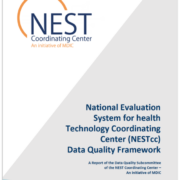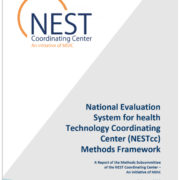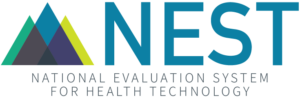NESTcc publishes Data Quality Maturity Model Self-Assessment Tools to complement initial Data Quality Framework
In February 2020, NESTcc’s Data Quality Subcommittee released the initial version of a Data Quality Framework that all stakeholders across the NESTcc medical device ecosystem could use. Grounded in the use of real-world data (RWD) gleaned from clinical care settings, the Framework describes guiding principles and a foundation for the capture and use of high-quality data for post-market evaluation of medical devices.
NESTcc subsequently tasked the Data Quality Subcommittee with translating the initial version of the Framework into tools that NESTcc and its Network Collaborators could use to assess data quality on an ongoing basis. Although the initial Data Quality Framework focuses on electronic health record (EHR) data in the clinical care setting, the Data Quality Subcommittee was asked to extend the concepts to claims data and develop self-assessment tools for EHR and claims data.
The NESTcc Data Quality Maturity Model
Organizational maturity can be described as an expression of the capabilities of an organization in a specific domain, with the intent to foster continuous improvement across those capabilities. Maturity models are typically self-administered by organizations to assess current state, model business capabilities, identify opportunities and perform capacity planning.
The NESTcc Data Quality Maturity Model proposes five stages of maturity reflecting increasingly advanced and integrated levels of performance for health care organizations to partner within the NESTcc ecosystem:
NESTcc Data Quality Maturity Model Self-Assessment Tools
The model is intended to be use-case specific (i.e., evaluation of the maturity of the organization relevant to an intended purpose of the data). In addition, each stage is not intended to be absolute (i.e., requiring completion of all performance aspects). Instead, accomplishments within a stage are more likely to be graded.
The translational tools developed by the Data Quality Subcommittee are intended to support continuous assessment of an organization’s data quality for EHR and claims data sources.
DOWNLOAD THE SELF-ASSESSMENT TOOLS
Get a better understanding of your organization’s data maturity from collection to management and use.
– YOU MIGHT ALSO BE INTERESTED IN –




